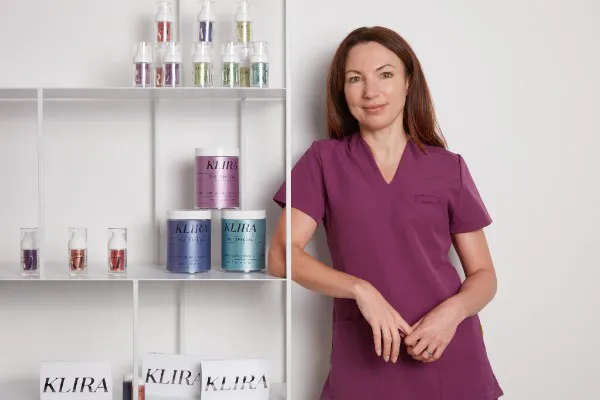
The Future of Personalised Skincare
Dr Emma Craythorne, a leading consultant dermatologist and founder of Klira, explains why personalisation isn’t just a trend, it’s the future of dermatology
Skincare is one of the pillars of a successful aesthetic practice. Not only does it support procedures performed in clinic, but evidence-based and medical-grade skincare is a powerful tool in its own right for tackling age-related concerns and managing and treating skin conditions.
In Hamilton Fraser’s annual survey, skincare was cited as the second most common service practitioners offer after injectables, with 56.9% saying they sell it. Add to this the fact that consumers are increasingly seeking products and services tailored to their unique needs and preferences, and it is no surprise that a recent report by Future Market Insights valued the global customised skincare market at $29.3 billion (a figure it forecasts will grow to $62.4 billion by 2034).
Someone who has been ahead of the curve when it comes to catering for this demand is Dr Emma Craythorne, a consultant dermatologist and the founder of Klira, a bespoke prescription skincare brand. We caught up with her to find out more.
Consulting Room: What do we mean when we talk about personalisation?
Dr Emma Craythorne: From a dermatology perspective, personalisation means truly understanding the skin of the person in front of you, not comparing it to anyone else. Everyone’s skin is unique. It’s shaped not just by genetics, but by epigenetics too – your lifestyle, diet, and everything your skin has been through. That’s why even identical twins might need different treatments.
In medicine, and dermatology in particular, we’re now able to look at how a person’s genes influence their response to treatments. For conditions like psoriasis, for example, certain medications will work better or more safely depending on your genetic makeup. The same goes for topicals – and that’s exactly what we do at Klira. We look at both genetics and life history to create skincare that’s truly tailored to you.
CR: You are a practising physician, running your own clinic, what inspired you to go on to develop a personalised skincare range?
EC: There were two big reasons, really. First, in clinic I kept seeing people who were confused by skincare marketing. They were buying products that promised to fix wrinkles or pigmentation, but most of them weren’t personalised, and often didn’t even contain the actives needed to make a real difference. I wanted to bring proper, evidence-based formulations – like we use in dermatology – to more people.
Second, I started noticing how much waste there was. People were buying into trends, trying a product once, then
then leaving it in a drawer or throwing it away. It felt like there had to be a better way, something simpler, more effective, and better for the planet.
That’s what drove Klira: personalised treatments based on real science, not hype. So people aren’t buying ‘hope in a jar’, they’re getting real, clinically backed solutions that actually work.
CR: You’ve got this 51-question SkinSize analysis. Tell me a little bit more about this, and how does that help you make things super personalised?
EC: The SkinSize analysis helps you look at your skin the way a dermatologist would. It focuses on four key areas: your skin barrier, sebum production, fibroblast activity, and melanocyte function.
We ask things like: Do you have a strong or sensitive skin barrier? Is your skin oily or dry? How well are your fibroblasts working? Do you need collagen-boosting ingredients or more protection? And how does your skin deal with pigment? Are you prone to dark spots, or do you get redness that lingers?
The answers help us build a clear picture of how your skin functions, so we can tailor your treatment in a really precise way.
CR: How does Klira work? Do consumers just do it themselves online or is it through a clinic?
EC: There are two arms to Klira. The first is where people complete our 51-question SkinSize analysis and upload photos online – it’s built to replace the in-person consultation, and we’ve tested it extensively across different communities. The second is in clinic settings, where trained professionals can make the decision directly, so the questionnaire isn’t needed there.
There’s even a middle ground; some clinics or salons stock Klira but aren’t medically qualified to assess skin, so their clients can go online and complete the questionnaire themselves.
Klira focuses solely on the nighttime serum. For the rest of the routine – cleanser, SPF, moisturiser – we give recommendations based on your skin type. Most are affordable and easy to find. It just helps take the guesswork out of finding the right products.
CR: What do you think the main advantage for clinicians is in terms of taking a more personalised approach with their patients?
EC: The biggest benefit for clinicians is that patients feel really special – they’re getting something made just for them. It’s not the same as what their friend or the person before them in the clinic is using. And because it’s tailored, they tend to get better results and stick to the treatment more easily.
With Klira, there’s no complicated routine – just two pumps every night. Behind the scenes, the formula adjusts every month based on the season and skin progress. In winter, for example, we might add more ceramides.
Patients love that it’s made fresh for them in the lab and arrives within 48 hours. It’s low on preservatives, high on personalisation – and that feels really special. That’s why they come back.
